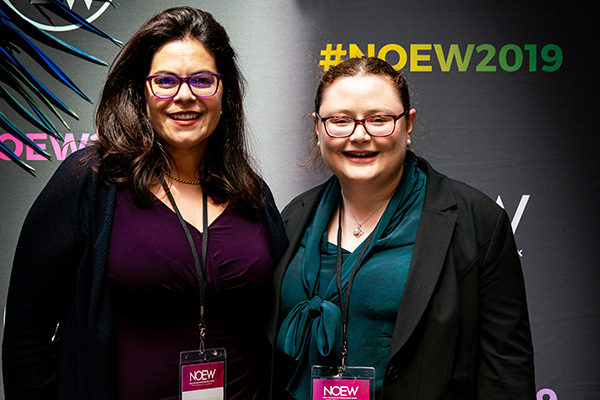
Assistant Professor of Accounting Serena Loftus, right, discussed the framework she and colleague Jasmijn Bol, left, developed to help companies deal with personnel management problems in a special talk hosted by the Lepage Center for Entrepreneurship and Innovation.
When companies fail to achieve organizational goals, company leadership often attributes it to a failure of personnel. If managers could do a better job hiring, training and evaluating employees, the thinking goes, the problem would be solved.
Serena Loftus and Jasmijn Bol have a different take.
“We see personnel problems as systems problems,” said Loftus, an assistant professor of accounting at the Freeman School. “The systems inside an organization need to get people to be willing to work, and then they need to direct those people’s work toward the right objectives. When they fail to do either of those effectively, that’s when you have problems.”
In December, Loftus discussed her work with Bol, a professor of accounting at the Freeman School, in a luncheon talk hosted by the Lepage Center for Entrepreneurship and Innovation. The discussion took place at the Shop at the Contemporary Arts Center.
Loftus and Bol specialize in personnel management systems, which encompasses topics including hiring, compensation,performance appraisal and organizational culture. They also share an interest in organizations that rely on employees to provide substantial intellectual contributions, such as knowledge industries and retailers.
After conducting hundreds of interviews with managers dealing with organizational problems, the professors concluded that those problems were not always caused by bad employees or poor managers. Instead, they were often the result of poor personnel management systems that failed to motivate employees and direct their work toward company objectives.
“When you put employees in a system where they’re getting certain messages about what the firm values, they’re going to behave according to those messages,” Loftus said. “So it is critical that organizational systems provide the right messages about the behavior the organization values.”
To help companies better motivate employees, Loftus and Bol developed a framework to guide companies seeking a holistic solution to personnel management issues. Loftus and Bol argue that companies need to focus not just on extrinsic rewards — such as salary or healthcare benefits — but on a broader range of rewards that prior research has shown to be effective. That includes recognizing the importance of employees’ emotional state, their social needs and their personal enjoyment of work.
“Not all organizations need to offer all rewards.” Loftus said. “The critical thing is that each organization offers the most important rewards for its specific employees. No two companies are going to have the same diagnosis of why their employees work hard.”
Just motivating employees isn’t enough, however. A good personnel management system also guides employee efforts toward the right company objectives. Loftus said companies that do a good job motivating employees to work hard can still fail to direct their work toward the company’s goals. A technology company that values innovation, for example, can’t evaluate employees solely on the basis of their contributions to established projects because that incentivizes employees to avoid innovative but potentially unviable projects.
“Once your organization has defined its objectives,” Loftus said, “it’s really about making sure that all systems in your firm are working together to send a consistent message that motivates and guides your employees’ work towards those objectives.”
Loftus and Bol received a Lepage Faculty Fellowship from the Lepage Center in the fall 2018 semester to support their research, and Loftus said they are continuing to conduct research examining their framework.

